Serbia v Albania: Drones, flags and violence in abandoned match
- Published
Riot police had to be brought in to restore calm but the Serbia-Albania match was abandoned, as Wendy Urquhart reports
British journalist Nick Ames was inside Belgrade's Partizan Stadium for the Euro 2016 qualifier between Serbia and Albania on Tuesday. Here is his eye-witness account of what happened as the match was abandoned amid chaotic scenes…
Partizan Stadium was quiet, perhaps too quiet, as half-time approached.
It was tempting to think Serbia's Euro 2016 qualifier against Albania - the latter's first visit to Belgrade since 1967 - was going to conclude without incident.
Serbia had dominated a slow-paced game and looked favourites to win at 0-0.
There had been little yet to rile a crowd that was bereft of away supporters after Uefa had stepped into a dispute over the terms under which travelling fans could attend the game.
How the incident unfolded |
|---|
A drone carrying an Albanian flag is flown above the stands and pitch at the Partizan Stadium |
Serbia defender Stefan Mitrovic pulls down the flag, which several Albania players then attempt to take |
A melee involving numerous players ensues, prompting English referee Martin Atkinson to lead the teams off the field after some fans got on to the pitch |
Following a delay of about 30 minutes, the match is abandoned |
That would change with the passing of a few confusing seconds that still require some untangling.
Martin Atkinson, an English Premier League referee, had already stopped play once when a flare thrown from the stands disrupted an Albanian corner.
He had to do so again shortly after the 40-minute mark when another firework only narrowly missed its white-shirted target.
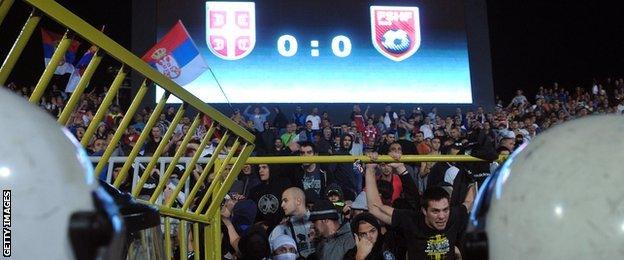
The match was abandoned in the 41st minute when the game was goalless
But there was something else afoot - a fact Serbia's players, Danko Lazovic chief among them, were straining to tell Atkinson as he supervised the extinguishing of the flare.
What few had noticed was that hovering over the Serbian half with a mixture of menace and filmic quirkiness was a small remote-controlled drone. More easily noticeable, once attentions had been caught, was the flag suspended from it that was being lowered slowly on to the pitch.
The flag bore the Albanian black-eagle insignia, a map of a notional 'Greater Albania' and the faces of Ismail Qemali and Isa Boletini, two important figures in the era that centred around the country's independence in 1912.
The politics relevant to the game can accurately be explained by Kosovo - a largely ethnically-Albanian territory that unilaterally declared independence from Serbia in 2008. , external
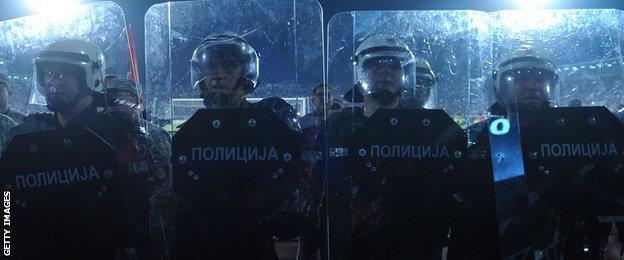
Serbian riot police officers stood guard during the Euro 2016 qualifier
A war was fought over Kosovo in the late 1990s, when the territory's ethnic Albanian insurgents battled with the Serbian military and police. Some Albanians see it as a natural part of the 'Greater Albania' that would include all areas of ethnic Albanian population. Kosovo has been recognised by the United States and major European Union countries but not by Serbia.
As soon as the flag was caught by Serbia's Stefan Mitrovic, events spiralled out of control.
The defender was confronted by two Albanian players, Andi Lila and Taulant Xhaka, who attempted to retrieve their flag - it was eventually recovered by their team-mate Bekim Balaj who ran with it towards the edge of the pitch.
But what had happened in the meantime was the death knell for this Balkan derby: a number of fans - including the unmistakeable figure of Ivan Bogdanov,, external a notorious Serbian ultra who served time in jail after hooligans caused a Euro 2012 qualifier in Italy to be abandoned, external in 2010 - penetrated the ring of police around the pitch.
Matters escalated quickly as members of staff from each side also piled in.
One supporter attacked Balaj with a plastic chair before he was wrestled to the ground by Albania captain and former Sunderland player Lorik Cana.
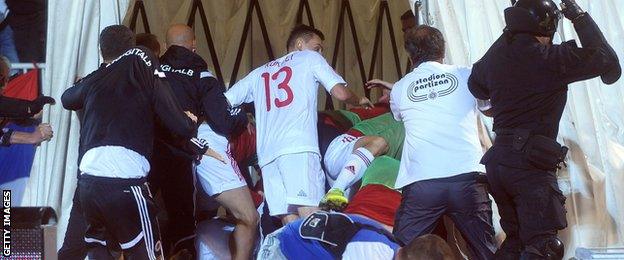
Albania's players run for cover after trouble breaks out during the Euro 2016 qualifier
Scuffles were breaking out everywhere, hands raised and blows being struck, and the pattern only ceased when the visiting players opted to run for the tunnel - situated below were some of Serbia's more vociferous ultras were positioned.
The Albanians scurried inside, pelted by missiles from the crowd, while another supporter broke through and aimed a head-high kick at one player.
In the press box, we received the unlikely news that the match might resume, but another 15 minutes or so later the game was abandoned.
Within an hour, there was little hint of the astonishing scenes that had just passed.
There were, of course, no obvious visiting fans. The identity of the drone's controller is still unclear despite a couple of early mis-steps in the local media - it is thought to have been operated inside the stadium - and other equally pressing questions remain.
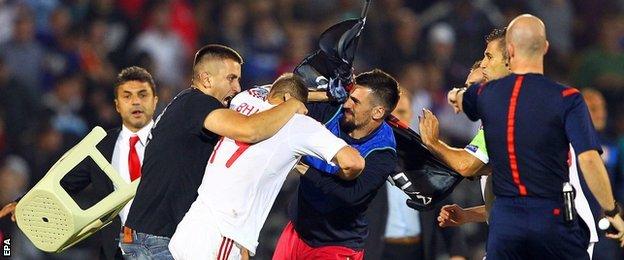
Fighting between players on the pitch occurred after the flag the drone was carrying was pulled down
The stadium's security, criticised heavily by Cana after the game, appears to have plenty to answer for given the ease with which supporters entered the pitch and the drone was brought in.
Serbia will fear a heavy punishment after this latest in a string of controversies, which has included Partizan Belgrade fans displaying an anti-Semitic banner in last month's Europa League match against Tottenham Hotspur.
They can point to provocation, although their own fans were far from angelic in much of their chanting towards the Albanians.
A Uefa investigation into the events is already under way.
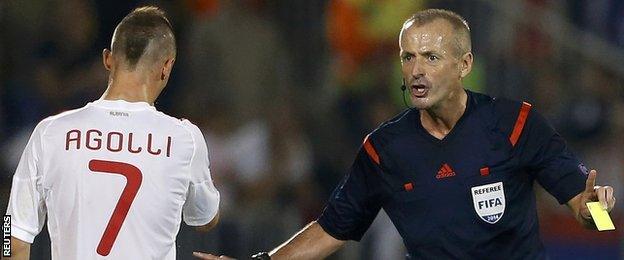
Referee Martin Atkinson, pictured here before the trouble broke out, led the players off the field
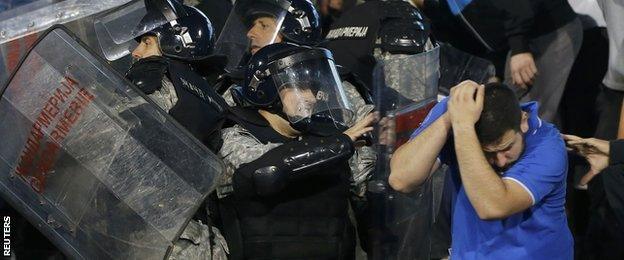
Riot police clash with fans during the Euro 2016 qualifier
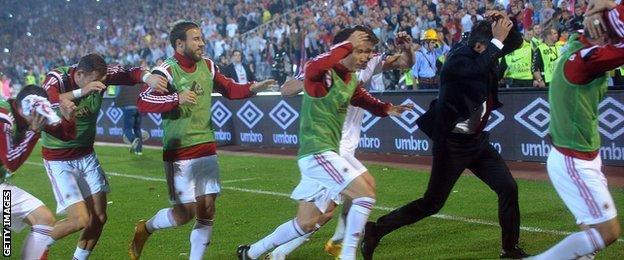
Albania players run for cover during the Euro 2016 qualifier
- Published15 October 2014
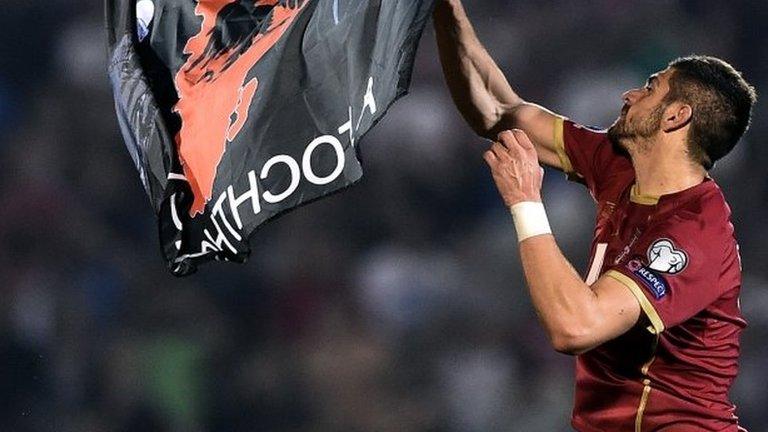
- Published15 October 2014
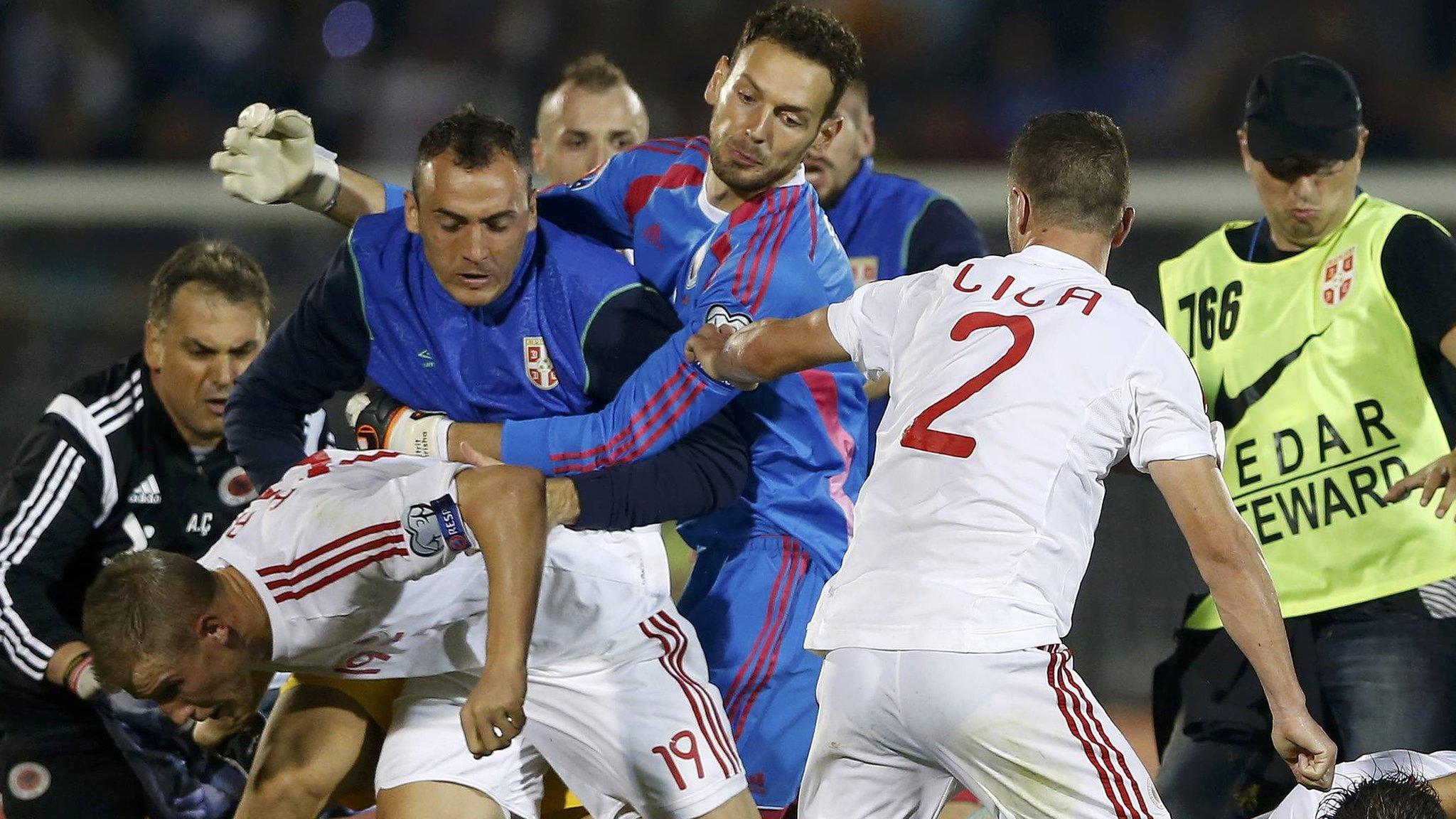
- Published12 October 2014

- Published14 October 2014
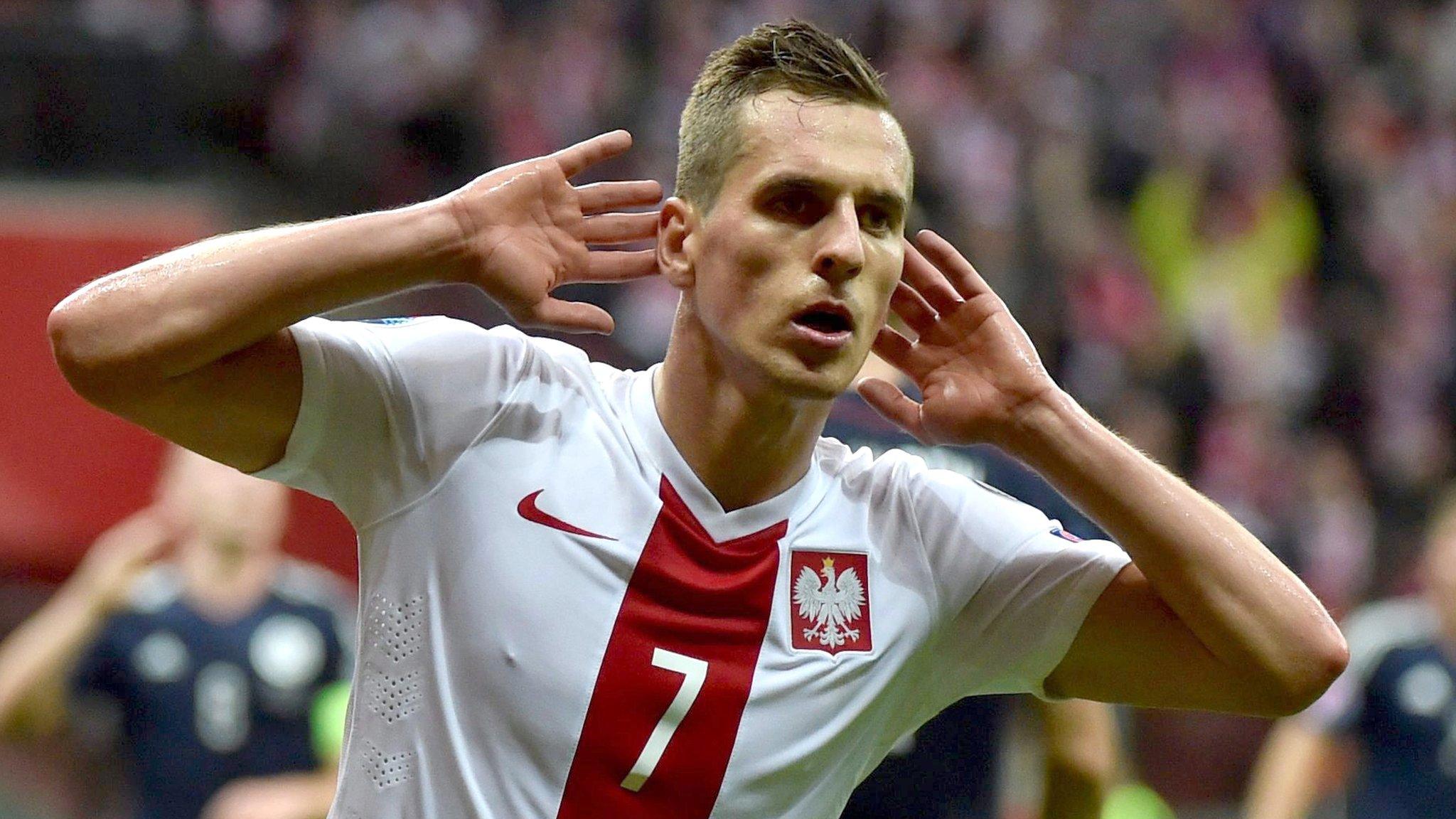
- Published14 October 2014

- Published14 October 2014

- Attribution
- Published28 January
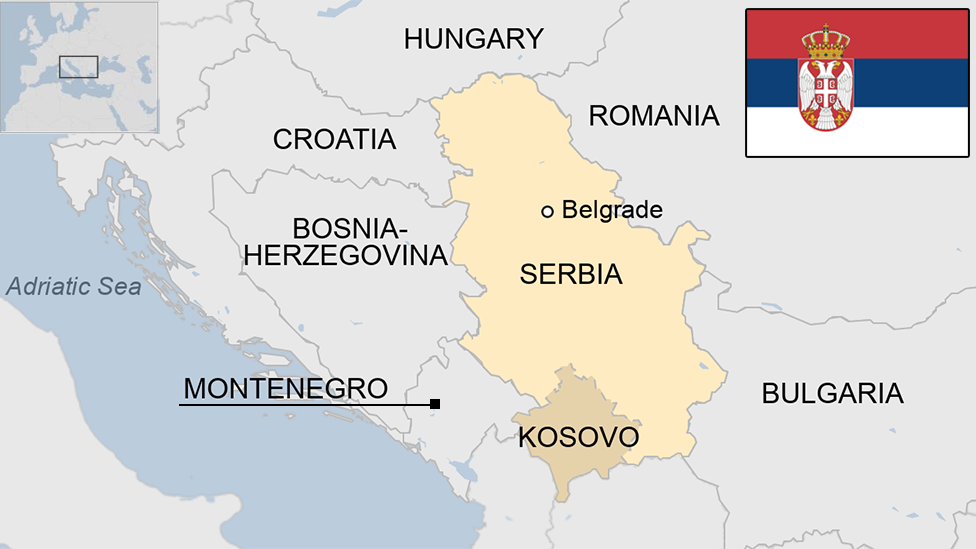
- Attribution
- Published28 June 2023
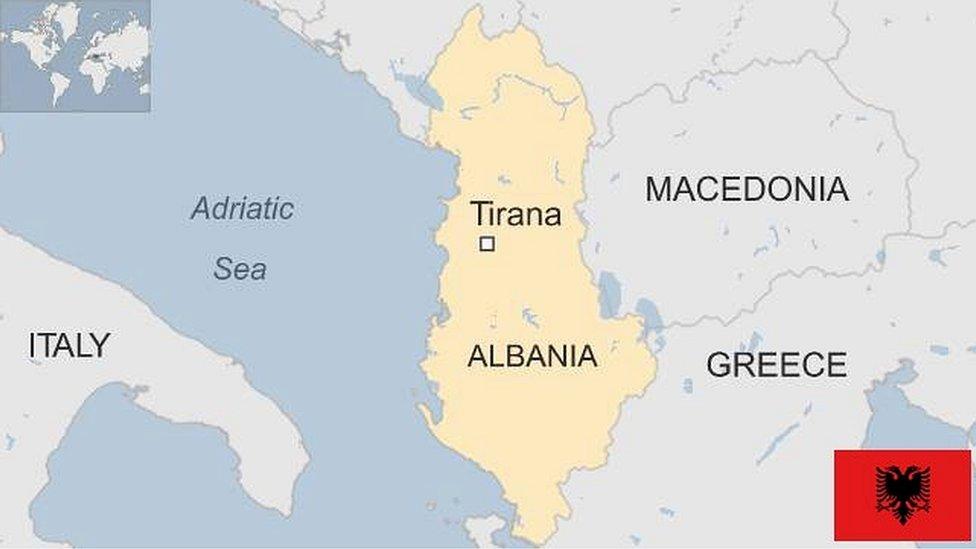
- Attribution
- Published25 November 2022